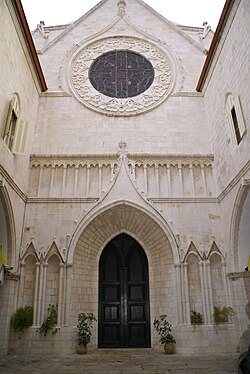Co-Cathedral of the Most Holy Name of Jesus
| Co-Cathedral of the Most Holy Name of Jesus | |
|---|---|
 |
|
| Location | Old City of Jerusalem |
| Denomination | Roman Catholic Church |
| Architecture | |
| Completed | 1872 |
The Co-Cathedral of the Most Holy Name of Jesus, also known as the Holy Name of Jesus Concathedral, is the co-cathedral, or technical cathedra, of the Latin Patriarchs of Jerusalem. It is located in the Christian quarter of the Old City of Jerusalem, about halfway between the New Gate and the Jaffa Gate, within the Old City walls.
In 1847 the Ottoman Empire allowed to the hierarchy of the Catholic Church to build a new cathedral in Palestine. The Co-Cathedral, completed in 1872, is part of the building complex of the Latin Patriarchate, effectively the bishop's church. For historical reasons, however, the Catholic Church has the Church of the Holy Sepulchre officially being the cathedral.
In neo-Gothic style, the church has a floor plan of a Greek cross with a length of 28 meters and a width of 24 meters. The three-aisled nave of the church has a width of 8.5 meters, the side aisles a width of 4.5 meters; these are overbuilt with galleries. The church has four decorated stained glass windows, marking the ends of the cross. Three of them have the same shape: the window above the high altar represents the risen Christ as victor over death, the window on the left shows the Crucifixion, and the window on the right depicts the Adoration of the Magi. The rear window over the entrance is a large rose window and represents the Four Evangelists. The church has five altars, three in the nave and the two aisles and two smaller ones on the ends of the transverse axis.
High altar window: The Resurrection
Left transverse axis: The Crucifixion
Right transverse axis: Adoration of the Three Kings
Internal view
The Latin Patriarch of Jerusalem is the head of the Roman Catholics in Cyprus, Israel, Jordan and the Palestinian autonomous areas. Most Roman Catholics in this region (except Cyprus) are Palestinian Christians. The most recent Patriarch, Fouad Twal, is a Palestinian. Patriarch Emeritus Michel Sabbah was the first Palestinian in this office.
...
Wikipedia
